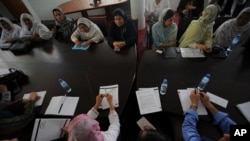Afghanistan’s transition toward leading its own security efforts must include the rights of Afghan women.
To help Afghanistan achieve this goal, U.S. Secretary of State Hillary Clinton unveiled the Women’s Action Plan earlier this year. Part of the U.S. Afghanistan and Pakistan Stabilization Strategy, the plan, said Secretary Clinton "includes initiatives focused on women’s security, women’s leadership in the public and private sector; women’s access to judicial institutions, education, and health services; and women’s ability to take advantage of economic opportunities, especially in the agricultural sector. This is a comprehensive, forward-looking agenda."
The Woman’s Action Plan continues to further these goals by encouraging dialogue between the Afghan women and government, at various parliament and provincial councils, the recent ministerial-level Kabul Conference, a peace jirga and follow-on shuras in Kabul, and at meetings held by the U.S. State Department.
"I speak from my own experience," said Secretary of State Clinton, "when I say that the work of Afghan women and civil society groups will be essential to this country's success. If these groups are fully empowered to help build a just and lasting peace, they will help do so. But if they are silenced and pushed to the margins of Afghan society, the prospects for peace and justice will be subverted."
The U.S. will also assist Afghan women by funding a number of new initiatives intended to improve maternal and child health; one of Afghanistan’s Millennium Development Goals. This will include doubling support for the Ministry of Public Health's Community Midwifery Education Program, and introducing a new Community Nursing Education Program. This will also include augmenting fiscal support for programs centered around gender equality and for an advocacy campaign to encourage the country’s religious leaders and prominent members of society to endorse access to said maternal health services.
The function of women in Afghanistan is an integral one, says Ambassador-at-Large for Global Women’s Issues, Melanne Verveer, who traveled to Afghanistan to reiterate the Secretary's message from the Kabul Conference and raise with the government how integral women are to the peace process. Ambassador Verveer also discussed the issue of adequate security for women and challenges for logistics during the upcoming elections.
"Women have a critical role to play in conflict resolution, in peace negotiations, in political transitions, and in post conflict reconstruction," said Ambassador Verveer. "If countries are to stabilize, and peace is to be secured and sustained in these situations, women have a key role to play. Nowhere is this more true than in Afghanistan where we recognize the important role that they must play."
U.S. Supports Women Of Afghanistan

Reinforcing the involvement of Afghan women in their efforts to advance the country's progress is essential to its success.



